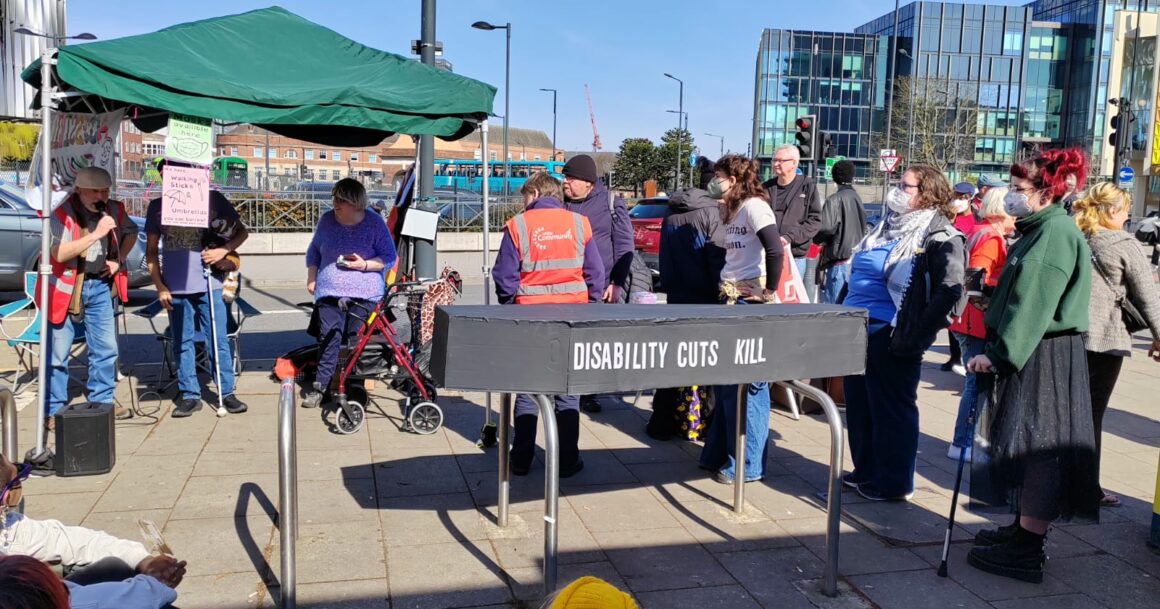

By Tim Nailsea
In her Spring Statement on Wednesday 26 March, Chancellor Rachael Reeves announced a round of vicious cuts to disability benefits.
The government is altering the points system for PIP to make it harder for people to claim the benefit. Claimants will have to display ‘greater difficulty’ in completing tasks, with a requirement to score a 4 or higher on a single element of the assessment, rather than being solely based on a cumulative score, as is currently the case. Assessments will also be made more frequent and use face-to-face meetings, rather than online or over the phone.
These assessments are already designed to ensure that as few people can claim as possible, and any disabled person who has gone through them will be able to confirm that there is no way that anyone who is not legitimately disabled would be able to pass. These changes will only result in disabled people being thrown off or denied their benefits. The mentally ill and those with chronic illnesses will be particularly severely impacted.
An estimated 370,000 people will lose PIP support, with an average loss of £4,500 per person a year. The health element of universal credit will also be cut for new claimants, and frozen for existing claimants until 2029. It is predicted that £3.4 billion will be saved by 2030 from disability and incapacity benefits adjustments. A further £500 million will be saved by the Universal Credit freeze. The government’s own report admits that these cuts will push 250,000 people into poverty, including 50,000 children.
Choices, choices
These cruel cuts are a political choice, and not, despite what Labour say, forced upon them by circumstances.
Of course, British capitalism is not performing well. The Office of Budget Responsibility has downgraded forecasted growth from 2% to 1% for the year. This, and increased borrowing costs will lead to a £4.1 billion shortfall in the budget by 2029-30. Inflation is expected to climb back up to 3.2% this year. Growth is expected to be further hit by the effects Trump’s tariffs will have on trade. Meanwhile, Labour’s much-vaunted infrastructure investment will likely not lead to gains in production for many years, if at all.
Going into the election last year, Reeves made three major pledges. These were: more spending on public services, lower taxes, and strict ‘fiscal rules’ restricting borrowing. The first pledge was designed to reassure Labour’s working-class base, the second and third to reassure business that British capitalism was safe in their hands. Due to sluggish growth, these three pledges can no longer be honoured, and it is telling that the promise made to Labour’s own supporters is the first to be abandoned.
One area that Reeves’ fiscal rules don’t apply is in defence spending, which is receiving a £2.2 billion cash injection. Some creative accounting, which designates money spent on defence as capital spending, makes it exempt from Reeves’ fiscal rules, allowing the government to spend such huge sums on the military while throwing hundreds of thousands of people into poverty. This, once again, is a political choice, and makes it clear what Labour’s priorities are.
Governing for the bosses
The Labour Party has always been a ‘capitalist workers’ party’—a party with a working class voting base and an organic link to the trade union movement, that nonetheless has a capitalist programme and governs in the interests of the ruling class.
Since Corbyn’s defeat, largely engineered by the right wing of the party, Starmer and his supporters have been fighting to return Labour to its pro-capitalist course, at pains to prove to big business that they can be trusted with the keys to the British state, and that they will be responsible stewards of British capital.
Therefore, when capitalists demand cuts, Labour will happily slash public spending and victimise some of the poorest and most vulnerable.
The unions, who provide the base, and most of the funding for the party, have responded with a round of criticism of the cuts. However, there have been no signs of any serious resistance, let alone a political break from the Labour Party. The union leaders, left to their own devices, will ultimately accept these cuts, as they have many times before under Labour governments.
Resistance will have to come from workers themselves, from the rank and file union members and people most affected by the cuts. The left must take the lead in forming a national campaign, but also local resistance movements, led by action committees drawn from unions, campaign groups and left organisations. Working class people are deserting the Labour Party in their millions; the left needs to outline a strategy to stop the cuts and march to war, and lay the basis for a revolutionary alternative to reformism.